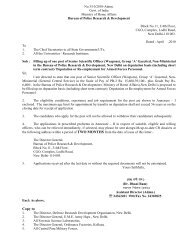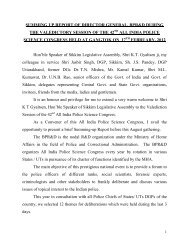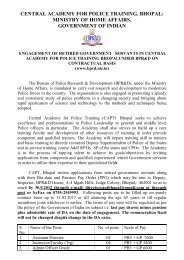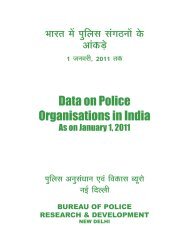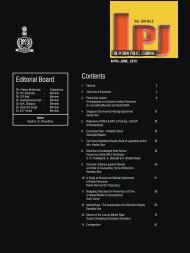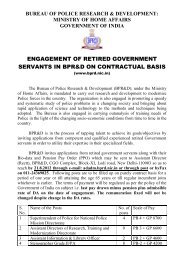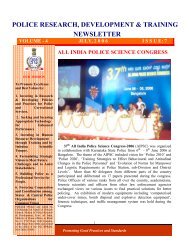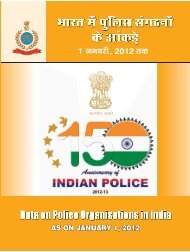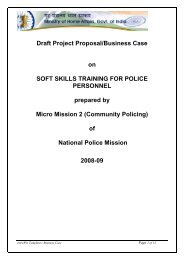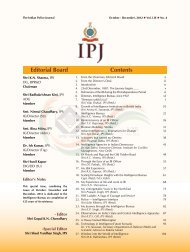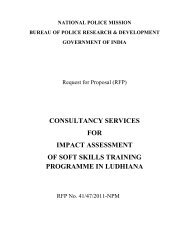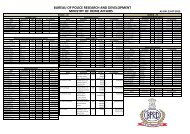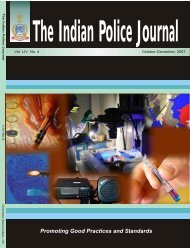SUPREME COURT & HIGHCOURT Rulings on POLICE
SUPREME COURT & HIGHCOURT Rulings on POLICE
SUPREME COURT & HIGHCOURT Rulings on POLICE
Create successful ePaper yourself
Turn your PDF publications into a flip-book with our unique Google optimized e-Paper software.
Held<br />
1.4 : ARREST AND CUSTODY<br />
Directorate of Enforcement vs Deepak Mahajan & anr.*<br />
The code gives power of arrest not <strong>on</strong>ly to a police officer and a Magistrate but also<br />
under certain circumstances for given situati<strong>on</strong>s to private pers<strong>on</strong>s. Further, when an<br />
accused pers<strong>on</strong> appears before a Magistrate or surrenders voluntarily, the Magistrates<br />
empowered to take that accused pers<strong>on</strong> into custody and deal with him according to<br />
law. Needless to emphasize that the arrest of a pers<strong>on</strong> is a c<strong>on</strong>diti<strong>on</strong> precedent for<br />
taking him into judicial custody thereof. To put it differently, the taking of the pers<strong>on</strong> into<br />
judicial custody is followed after the arrest of the pers<strong>on</strong> c<strong>on</strong>cerned by the Magistrate <strong>on</strong><br />
appearance or 'surrender. In every arrest, there is custody but not vice versa and that<br />
both the words "custody' and 'arrest' are not syn<strong>on</strong>ymous terms. Though 'custody' may<br />
amount to an arrest in certain circumstances but not under all circumstances. If these<br />
two terms are interpreted as syn<strong>on</strong>ymous, it is nothing but an ultra legalist<br />
interpretati<strong>on</strong>, which if under all circumstances accepted and adopted, would lead to a<br />
starling anomaly resulting in serious c<strong>on</strong>sequences.<br />
A Magistrate can himself arrest or order any pers<strong>on</strong> to arrest any offender if that<br />
offender has committed an offence in his presence and within his local jurisdicti<strong>on</strong> or <strong>on</strong><br />
his appearance or surrender or is produced before him and take that pers<strong>on</strong> (offender)<br />
into his custody subject to the bail provisi<strong>on</strong>s. If a case is registered against an offender<br />
arrested by the Magistrate and a follow up investigati<strong>on</strong> is initiated, or if an investigati<strong>on</strong><br />
has emanated quo the accusati<strong>on</strong>s levelled against the pers<strong>on</strong> appearing or<br />
surrendering or being brought before the Magistrate, the Magistrate can in exercise of<br />
the powers c<strong>on</strong>ferred <strong>on</strong> him by Secti<strong>on</strong> 167(2) keep the offender or pers<strong>on</strong> under<br />
judicial custody in case the Magistrate is not inclined to admit that offender or pers<strong>on</strong> to<br />
bail.<br />
To invoke S. 167(1), it is not an indispensable pre-requisite c<strong>on</strong>diti<strong>on</strong> that in all<br />
circumstances, the arrest should have been effected <strong>on</strong>ly by a police officer and n<strong>on</strong>e<br />
else and that there must necessarily be records, of entries of a case diary. Therefore, it<br />
necessarily follows that a mere producti<strong>on</strong> of an arrestee before a competent Magistrate<br />
by an authorised officer or an officer empowered is arrest (notwithstanding the fact that<br />
*1994 Cr.L.J. 2269<br />
21




